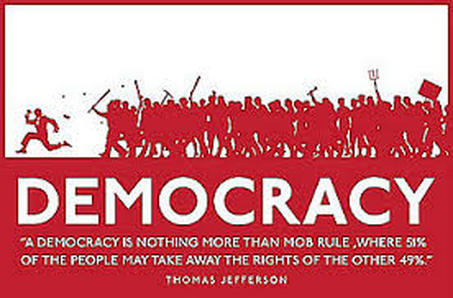 Op-ed: In the 1830s, the French government sent political scientists to the United States to see how the country they helped create was doing. The assumption was that democracy would be a tremendous success. What they found and reported on in “Democracy in America” was not all positive. Alexis-Charles-Henri Clérel de Tocqueville predicted democracy can be just “a scenario in which decisions made by a majority place its interests above those of an individual or minority group, constituting active oppression comparable to that of a tryant or despot,” Wikipedia reports. The U.S. has a presidential candidate to wants to deport Hispanics and Muslims. Wikipedia adds of the term: “The term was widely employed in mid-nineteenth-century America in conjunction with a series of moral questions (Sabbath, temperance, racial equality) that gave rise to organized minority groups in American political life. Lord Acton also used this term, saying: The one pervading evil of democracy is the tyranny of the majority, or rather of that party, not always the majority, that succeeds, by force or fraud, in carrying elections. The History of Freedom in Antiquity, 1877 The concept itself was popular with Friedrich Nietzsche and the phrase (in translation) is used at least once in the first sequel to Human, All Too Human (1879). Ayn Rand wrote that individual rights are not subject to a public vote, and that the political function of rights is precisely to protect minorities from oppression by majorities and "the smallest minority on earth is the individual". In Herbert Marcuse's 1965 essay "Repressive Tolerance", he said "tolerance is extended to policies, conditions, and modes of behavior which should not be tolerated because they are impeding, if not destroying, the chances of creating an existence without fear and misery" and that "this sort of tolerance strengthens the tyranny of the majority against which authentic liberals protested." For those cheering the exit of the United Kingdom from the European Union, consider these questions. Also, consider whether such a powerful decision should be made by a small majority. The vote was roughly 52 percent to 48 percent, or 17,410,742 to leave and 16,141,241 to stay. Scotland, which rejected independence two years ago by a bigger margin, feels betrayed; Scotland's First Minister Nicola Sturgeon said she would push for a vote to allow it to stay in the EU. Republican presumptive nominee Donald Trump, who was in Scotland, praised the referendum decision to leave the European Union. Other world leaders have warned an exit could create havoc, and Trump’s endorsement could hurt him in his campaign against former Secretary of State Hillary Clinton. She issued a cautious statement supporting the rights of all sides in the dispute. Despite non-stop punditry on television and the Internet the fact is no one knows what is going to happen.
1 Comment
|
Robert Weller
2016 US election news and other news from the USA
Bio
Worked in journalism, including on the Internet, for more than 40 years. Started as a news editor at the Colorado Daily at the University of Colorado, joined a small Montana newspaper, the Helena Independent-Record, and then United Press International. Archives
November 2016
Categories
All
|
